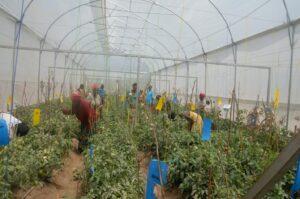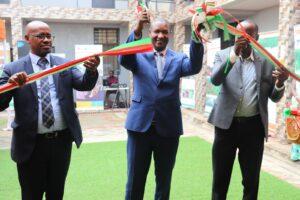From May 19 to 26, 2025, the Groupe de recherche et d’échanges technologiques (GRET), an international development organization, conducted a strategic diagnostic mission in the three CACAOECO project implementation zones, namely: Adzopé, Divo and San Pedro.
The aim of this mission was to collect data for the development of a strategic plan for the establishment of biofactories, organic input production units that aim to revolutionize cocoa farming in Côte d’Ivoire through agroecology.
The biofabrique is a local agroecological input production unit. Its installation enables the production of various organic inputs, such as fermented forest litter, liquid biofertilizers (bioles), bioprotectors, mineral slurries and Bokashis, from natural materials accessible to growers. These different inputs help restore soil fertility, improve yields and protect crops without resorting to synthetic chemicals.
GRET’s mission, led by Mr. Guillame Le Poutre, consultant economist, was based on a participatory methodology, including meetings with the heads of agricultural cooperatives, field visits, as well as interviews with certain financial players, with a view to gathering the realities of each project zone for the construction of a realistic and contextualized implementation plan.
This plan should include a description of the biofactory’s business model, realistic financial projections, a strategic implementation plan for the three zones, and monitoring and evaluation tools adapted to local conditions.
During the discussions, some producers, on behalf of the 750 direct beneficiaries of the project, expressed both hope and concern. While there is interest in organic inputs, affordability remains a major constraint. Chemical fertilizers, although harmful to cocoa production in the long term, are often preferred for their low cost and immediate effectiveness on production.
The CACAOECO project is part of a process of ecological transition in the cocoa sector in Côte d’Ivoire. Faced with crucial issues such as deforestation, soil degradation, declining productivity and excessive use of chemicals, the project aims to strengthen the resilience of farming systems by introducing organic inputs into cocoa production.
Through this project, INADES-Formation aims to provide enhanced technical support during and after the project, as well as an economically viable biofactory model that takes into account the income level of small-scale farmers. Another challenge identified is to raise awareness of the long-term negative effects of chemicals, which farmers are often unaware of.
By 2027, the CACAOECO project aims to build 10 biofactories in target areas, provide training and sustainable technical support for cooperatives, strengthen the administrative, economic and commercial capacities of 10 partner agricultural cooperatives, and achieve a sustainable increase in productivity through the gradual restoration of degraded ecosystems.
This preparatory mission marks a decisive step in the implementation of the project. The success of this project could well serve as a replicable model in other regions of West Africa.
The CACAOECO project is funded by the Agence Française de Développement and implemented by INADES-Formation.











